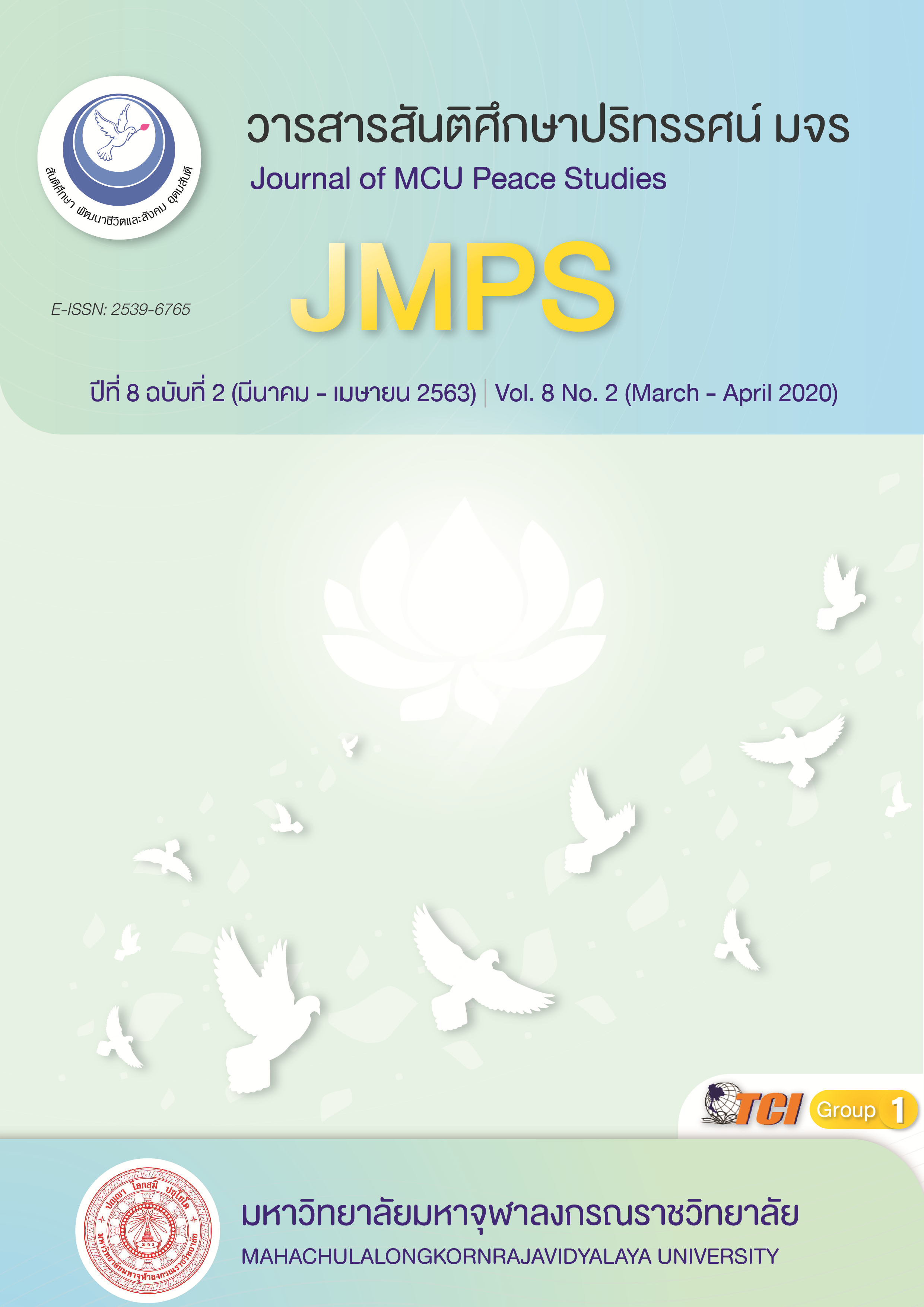การพัฒนาระบบการบริหารสิ่งประดิษฐ์และนวัตกรรมอาชีวศึกษาสู่เชิงพาณิชย์ ในยุคดิจิทัลด้วยแพลตฟอร์ม
Main Article Content
บทคัดย่อ
การวิจัยครั้งนี้ มีวัตถุประสงค์เพื่อ 1) ศึกษาองค์ประกอบของระบบการบริหาร 2) พัฒนาระบบการบริหาร 3) ทดลองใช้ระบบการบริหาร และ 4) ประเมินผลระบบบริหารสิ่งประดิษฐ์และนวัตกรรมอาชีวศึกษาสู่เชิงพาณิชย์ในยุคดิจิทัลด้วยแพลตฟอร์ม ดำเนินการวิจัยใน 4 ขั้นตอน คือ การศึกษาองค์ประกอบของระบบการบริหารสิ่งประดิษฐ์และนวัตกรรมอาชีวศึกษาสู่เชิงพาณิชย์ในยุคดิจิทัลด้วยแพลตฟอร์ม โดยศึกษาจากเอกสารและสัมภาษณ์ผู้เชี่ยวชาญ จำนวน 5 คน การพัฒนาระบบการหาร หัวหน้างานวิจัยพัฒนานวัตกรรมและสิ่งประดิษฐ์ และผู้ที่เกี่ยวข้อง จำนวน 9 คน และการประเมินผลระบบการบริหาร โดยกลุ่มตัวอย่าง ได้แก่ ผู้บริหาร และหัวหน้างานที่เกี่ยวข้อง สังกัดสำนักงานคณะกรรมการการอาชีวศึกษา โดยการคัดเลือกแบบเจาะจง จำนวน 32 คน เครื่องมือที่ใช้ในการวิจัย ได้แก่ แบบบันทึกข้อมูล แบบสัมภาษณ์ แบบบันทึกการสนทนากลุ่ม แบบประเมิน และแบบสอบถาม วิเคราะห์ข้อมูลโดยการหาค่าความถี่ ร้อยละ ค่าเฉลี่ย ส่วนเบี่ยงเบนมาตรฐาน และการวิเคราะห์เนื้อหา
ผลการวิจัย พบว่า 1) องค์ประกอบของระบบบริหาร โดยผู้เชี่ยวชาญด้านเทคโนโลยีสารสนเทศ จำนวน 5 คน การทดลองใช้ระบบการบริหาร โดยผู้บริการบริหารสิ่งประดิษฐ์และนวัตกรรมอาชีวศึกษาสู่เชิงพาณิชย์ในยุคดิจิทัลด้วยแพลตฟอร์ม ประกอบด้วย (1.1) ปัจจัยนำเข้า (1.2) ดำเนินการด้วยแพลตฟอร์มซึ่งใช้กระบวนการบริหาร PDCA (1.3) มีการกำหนดผลลัพธ์ที่พึงประสงค์ และ (1.4) มีการศึกษาข้อมูลย้อนกลับจากผลการประเมินระบบ 2) การพัฒนาระบบบริหารโดยใช้เทคโนโลยีแพลตฟอร์มประกอบด้วยส่วนต่างๆ ได้แก่ (2.1) ผู้ซื้อ (2.2) ผู้ประดิษฐ์ (2.3) ข้อมูลสินค้า (2.4) ส่วนการขาย (2.5) การชำระเงิน และ (2.6) การรายงานผล ซึ่งผลการประเมินอยู่ในระดับมากที่สุด 3) ผลการทดลองใช้ระบบโดยการจัดสนทนากลุ่มผู้เกี่ยวข้องทุกคนเห็นด้วยกับระบบการบริหารที่พัฒนาร้อยละ 100 และ 4) ผลการประเมินระบบการบริหารภาพรวมเฉลี่ยอยู่ในระดับมาก
Article Details
ทัศนะและความคิดเห็นที่ปรากฏในบทความในวารสาร ถือเป็นความรับผิดชอบของผู้เขียนบทความนั้น และไม่ถือเป็นทัศนะและความรับผิดชอบของกองบรรณาธิการ ยินยอมว่าบทความเป็นลิขสิทธิ์ของวารสาร
เอกสารอ้างอิง
Bureau of Vocational Education Research and Development. (2017). Handbook of research management and innovation for vocational education. Bangkok: Bureau of Vocational Education Research and Development.
Chokpriwan, S., & Subsri, Y. (2018). Digital marketing strategies on online platforms (Research report). Bangkok: Siam University.
Gulati, S., Verayangkura, M., & Sirirak, S. (2018). Causal of Digital Marketing Influencing Hotel Customers’ Satisfaction and Loyalty in the Andaman Triangle Cluster, Thailand. Journal of the Association of Researchers, 23(3).
Jaruwat, N. (2017). Marketing 4.0. Bangkok: Nation Publishing.
Jirarotephinyo, N. (2019). Relationship between information technology competency and information system administration of school administrators under the office of Kanchanaburi Primary Educational Service Area. Nakhon Phanom University Journal, 9(2),18-24.
Leungphirom, S. (2015). Management Information System. Nonthaburi: Muangthaibook.
Ministry of Science and Technology. (2018). The role and importance of "innovation" to the country's industrial development. Retrieved February 15, 2018, from http://www.most.go.th
Nekham, R., & Musikanon, C. (2015). The opinions of administrators and teachers towards information management system for internal quality assurance of Nuntaburee Network Schools Aumkoy District Chiangmai Province. Lampang Rajabhat University Journal, 4(1),130-160.
Office of National Economic and Social Development Council. (2016). National economic and social development plan no. 12. 2017-2021. Bangkok: Prime Minister's Office.
Office of Vocational Education Commission. (2018). Mission. Retrieved February 15, 2018, from http://www.vec.go.th/th-th.
Pinnok, T., & Vihokto, P. (2017). The development of the mis program information on the quality of the learner to the management quality assurance within the school under the secondary three education. Journal of MCU Social Science Reviews, 6(3), 113-125.
Runcharoen, T. (2017). The direction of educational management towards education 4.0 in the digital age. Educational administration articles and development arrange learning to study in the digital age, No 1. Bangkok: The Professional Development Association of Educational Administration of Thailand.
Secretariat of the Prime Minister. (2017). Thailand 4.0 Propel the future towards stability, wealthy and sustainability. Thai Khu Fah Journal, 33.
Suntrayuth, D. (2008). Educational Management Theory. Bangkok: Natikul Press Company.
Thanyarattakul, T. (2018). Digital Transformation in Action. 2nd Edited. Bangkok: Wish Publishing.
Wu, M. (2004) . Continuous evaluation of information system development. A reference models. Dissertation Abstracts International, 2569-A.


